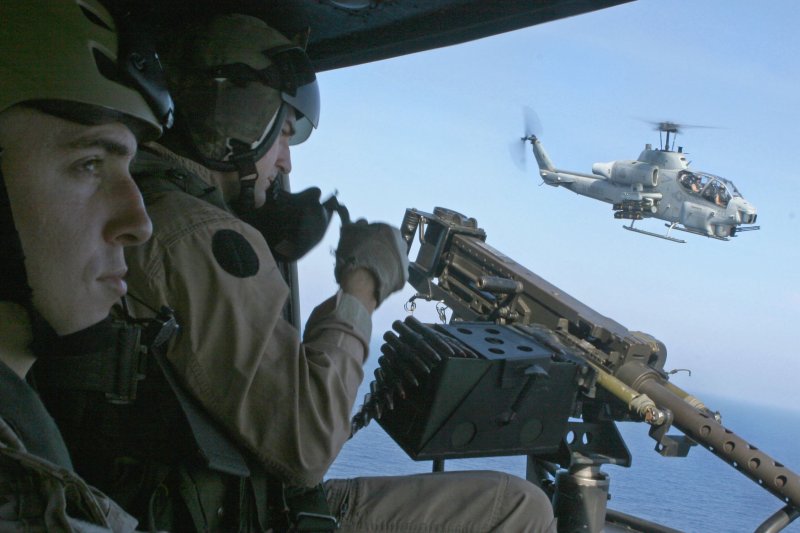1 of 9 | An AH-1 helicopter escorts a UH-1Y helicopter while U.S. Marine Corps Staff Sgt. Bryan E. Campbell prepares an M2.50 caliber machine gun in support of counter-piracy surveillance operations over the Gulf of Aden, April 6, 2009. Hijacked Maersk-Alabama cargo ship captain Richard Phillips was rescued by U.S. Navy forces, killing three pirates, on April 12, 2009. (UPI Photo/Robert C. Medina/U.S. Marines) |
License Photo
WASHINGTON, April 13 (UPI) -- U.S. President Barack Obama passed his first test as commander in chief with flying colors in approving the rescue of Capt. Richard Phillips, but the pirates of Somalia have vowed they will strike back.
U.S. Navy snipers, their commander fearing that Maersk Alabama Capt. Richard Phillips was in imminent danger, killed three of Phillips' captors and captured a fourth. The gunfire ended an incident that began Wednesday when pirates attacked the Maersk Alabama off the coast of Somalia. They were repelled but took Phillips with them and held him in a lifeboat as Navy vessels converged on the site.
Compared with most of the military crises and challenges any president of the United States faces during his term of office, this was a small and straightforward one, but it contained many important lessons for President Obama and the American people.
First, U.S. Special Forces today remain probably the best in the world. Ironically, in large part that is because they have had so much practice over the past seven and a half years in the conflicts in Afghanistan and Iraq and in the war on terror that the president and Secretary of State Hillary Clinton have insisted on renaming more innocuously.
Russian special forces are first-class in aggressive specialized military operations, but in their greatest test in recent years, the horrific slaughter of hundreds of innocent children at Beslan in the Caucasus in 2004, their performance in rescuing hostages was woeful. Indian special forces also performed miserably in their belated hostage-rescue operation in Mumbai last November.
The French rescue operation of a hijacked yacht simultaneously with Phillips' rescue Sunday was not quite as successful; one hostage was killed. But it certainly rates as a relative success.
Second, the president and his highly experienced secretary of defense, Robert Gates, wisely gave the military specialists a free hand to plan and carry out the actual rescue. The experienced influence of national security adviser Gen. James Jones, the former commandant of the U.S. Marine Corps, can also be discerned in that.
Micro-meddling by civilian amateurs in the tactical details of any military operation, whether large or small, usually works catastrophically. Adolf Hitler did so all the time. Josef Stalin belatedly learned not to. It was Stalin who won the colossal clash of their armies, the greatest war of all time.
In modern U.S. history, Presidents John F. Kennedy and Jimmy Carter were notorious micromanagers. A potentially catastrophic confrontation between U.S. Army and Red Army tanks at the Berlin Wall in 1961 famously was only resolved when the young U.S. Army lieutenant on the spot falsely claimed he could no longer hear Kennedy's instructions on his radio communications and defused the tension by himself with his Soviet opposite numbers.
Carter's obsessive micromanaging in insisting that the number of helicopters used in the Iran rescue plan be cut to the absolute minimum ensured the operation would collapse at the first setback.
Third, while it has been fashionable for many American pundits to take cheap shots at France and the French for so long, their special forces were in the heart of the action at the same time America's were. It is timely to remember that on that dark day in 1983 when 243 American servicemen, including 220 Marines, were slaughtered by an Iran-backed Hezbollah suicide bomber as they slept in their barracks in Lebanon, 58 French paratroopers were killed in an almost simultaneous attack.
The pirates are now threatening retaliation against U.S. and French interests and have stepped up attacks in recent weeks. To Western civilian eyes, it appears irrational for them to threaten their lucrative business by risking enraging U.S. President Obama and French President Nicolas Sarkozy, but then the pirates are not secular Western civilians. If they were, they wouldn't be pirates.
The great Classical Greek historian Thucydides knew far more about the nature of war than even Carl von Clausewitz, the 19th century Prussian analyst who famously described war as the continuation of politics, or state policy, by other means. But wars are almost never as tidy, neat or rational as that. Clausewitz's own disciples in Germany eventually embroiled their nation in two horrific world wars that utterly destroyed it.
Therefore, the rescue of Phillips is very unlikely to reduce the number of Somali pirate attacks, and the pirates can be expected to carry out their threats against U.S. vessels. The only way to prevent more and worse hostage crises in the Gulf of Aden, therefore, would be for the U.S. Navy and its allies to aggressively attack the pirate bases on the coast of Somalia with full intent to destroy them -- and to make this intention and commitment very clearly known to the pirates in advance.
Finally, Obama made a welcome break with the practice of so many of his predecessors by staying silent and low-key on the crisis, while empowering local commanders on the scene to take the necessary actions when the time was right.
Far too often, the bumptious, pompous rhetoric of U.S. presidents has locked them and the country into either humiliating fiascoes, like Carter's 444-day agony at the hands of the Iranians when they held 52 American hostages. President George W. Bush's proclamation of "Mission Accomplished" in Iraq on the deck of the USS Abraham Lincoln on May 1, 2003, haunted him for the rest of his presidency -- and still does.
The rescue of Phillips was only a prologue to the challenges Obama will face in the field of national security. But it was a good start.















